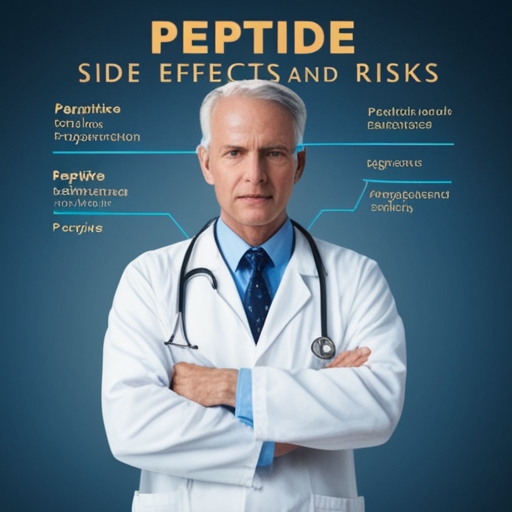Peptide Side Effects and Risks – What You Need to Know

Peptides are fascinating molecules that have gained significant attention in recent years due to their potential applications in medicine, cosmetics, and scientific research. These short chains of amino acids play crucial roles in various biological processes and offer promising avenues for therapeutic interventions and personal care products. As the interest in peptides continues to grow, it's essential to understand their nature, uses, and potential risks.
What Are Peptides?
Peptides are short sequences of amino acids linked by peptide bonds. Unlike proteins, which are typically longer and more complex, peptides are smaller molecules consisting of fewer amino acids. Bioactive peptides are particularly interesting due to their ability to influence physiological processes in the body.
Peptides can be:
- Naturally occurring in living organisms
- Synthesized in laboratories
- Extracted from various biological sources
These versatile molecules serve as building blocks for proteins and perform numerous functions in the body, including acting as hormones, neurotransmitters, and enzymes.
Common Uses of Peptides
The applications of peptides span across various fields, including medicine, cosmetics, and scientific research. Some common uses include:
1. Medical Applications: Peptides are used in treatments for conditions such as diabetes, cancer, and hormone imbalances. Peptide therapy has gained popularity for its potential to address various health concerns.
2. Cosmetic Products: Anti-aging creams and serums often contain peptides to promote collagen production and improve skin elasticity.
3. Sports and Fitness: Some peptides are used to enhance muscle growth and recovery, although their use in competitive sports is often regulated or prohibited.
4. Research: Peptides serve as valuable tools in scientific research, helping scientists study biological processes and develop new therapies.
Peptide Synthesis and Production
The production of peptides involves complex processes carried out by specialized peptide manufacturers. These processes include:
- Solid-phase peptide synthesis
- Liquid-phase peptide synthesis
- Recombinant DNA technology
Peptide quality control is crucial to ensure the purity and efficacy of the final product

. This involves rigorous testing and analysis, including peptide purity tests and peptide batch testing.
Peptide Forms and Administration
Peptides are available in various forms, including:
- Peptide powders: Often require reconstitution before use
- Peptide solutions: Ready-to-use liquid formulations
- Peptide vials: Typically contain lyophilized peptides for storage and reconstitution
The administration of peptides varies depending on their intended use and formulation. Common methods include:
1. Subcutaneous injections
2. Topical applications
3. Oral supplements
4. Nasal sprays
Proper peptide reconstitution and peptide storage are critical for maintaining the stability and efficacy of these molecules.
Potential Side Effects and Risks
While peptides offer numerous potential benefits, they can also cause side effects in some individuals. Common side effects may include:
- Skin irritation at injection sites
- Allergic reactions
- Changes in blood pressure or heart rate
- Nausea or digestive issues
It's crucial to be aware of these potential risks and to use peptides under the guidance of a healthcare professional. Peptide safety should always be a top priority for users and manufacturers alike.
Peptide Clinics and Professional Guidance
Peptide clinics have emerged as specialized facilities offering peptide therapies and consultations. These clinics typically employ healthcare professionals who can provide guidance on:
- Appropriate peptide selection
- Dosage and administration
- Monitoring for side effects
- Integrating peptide therapy with other treatments
When considering peptide therapy, it's essential to choose reputable clinics and consult with qualified healthcare providers.
Peptide Suppliers and Online Marketplaces
The growing interest in peptides has led to the emergence of numerous peptide suppliers and online peptide stores. When purchasing peptides, it's crucial to consider:
- Peptide authentication: Ensuring the product is genuine and matches its claimed identity
- Peptide purity: Verifying that the product meets high standards of purity
- Peptide certificates: Documentation providing information about the product's quality and testing
Reputable suppliers often provide peptide customer service to assist with inquiries and support proper use of their products.
Legal and Regulatory Considerations
The legal status of peptides varies widely depending on the specific peptide and the jurisdiction. In some cases, peptides may be classified as:
- Prescription medications
- Over-the-counter products
- Research chemicals
- Dietary supplements
It's essential to understand the peptide legality in your area and to comply with all relevant regulations. Some peptides may be restricted for research use only, while others may be approved for specific medical applications.
Peptide Pricing and Availability
Peptide pricing can vary significantly based on factors such as:
- Complexity of the peptide sequence
- Purity level
- Quantity purchased
- Supplier reputation
Some suppliers offer peptide deals or peptide sales, particularly for bulk purchases. Peptide wholesalers may provide more competitive pricing for larger quantities.
Peptide Storage and Shelf Life
Proper peptide storage is crucial for maintaining the stability and efficacy of these molecules. Key considerations include:
- Temperature control
- Protection from light and moisture
- Sterile handling techniques
The peptide shelf life can vary depending on the specific peptide and storage conditions. Always follow the manufacturer's recommendations for storage and use.
Future of Peptide Research and Applications
The field of peptide research continues to evolve rapidly, with promising developments in areas such as:
- Targeted drug delivery
- Personalized medicine
- Tissue engineering
- Nanotechnology
As our understanding of peptides grows, we can expect to see new and innovative applications in medicine, biotechnology, and other fields.
Conclusion
Peptides represent a fascinating and rapidly evolving area of research with numerous potential applications. From medical treatments to cosmetic products, these versatile molecules offer promising avenues for addressing various health and wellness concerns. However, it's crucial to approach peptide use with caution, understanding both the potential benefits and risks involved.
As the peptide market continues to grow, consumers and researchers alike must prioritize safety, quality, and compliance with legal and ethical standards. By working with reputable suppliers, consulting healthcare professionals, and staying informed about the latest developments in peptide research, individuals can make informed decisions about incorporating peptides into their health and wellness routines.
Frequently Asked Questions
How do I know if a peptide supplier is reputable?
Look for suppliers that provide detailed product information, offer peptide certificates, conduct rigorous quality control tests, and have positive customer reviews.
Are peptides safe for long-term use?
The safety of long-term peptide use can vary depending on the specific peptide and individual factors. Always consult with a healthcare professional for personalized advice.
Can peptides be used alongside other medications?
Peptides may interact with other medications. It's crucial to discuss all current medications and supplements with a healthcare provider before starting peptide therapy.
